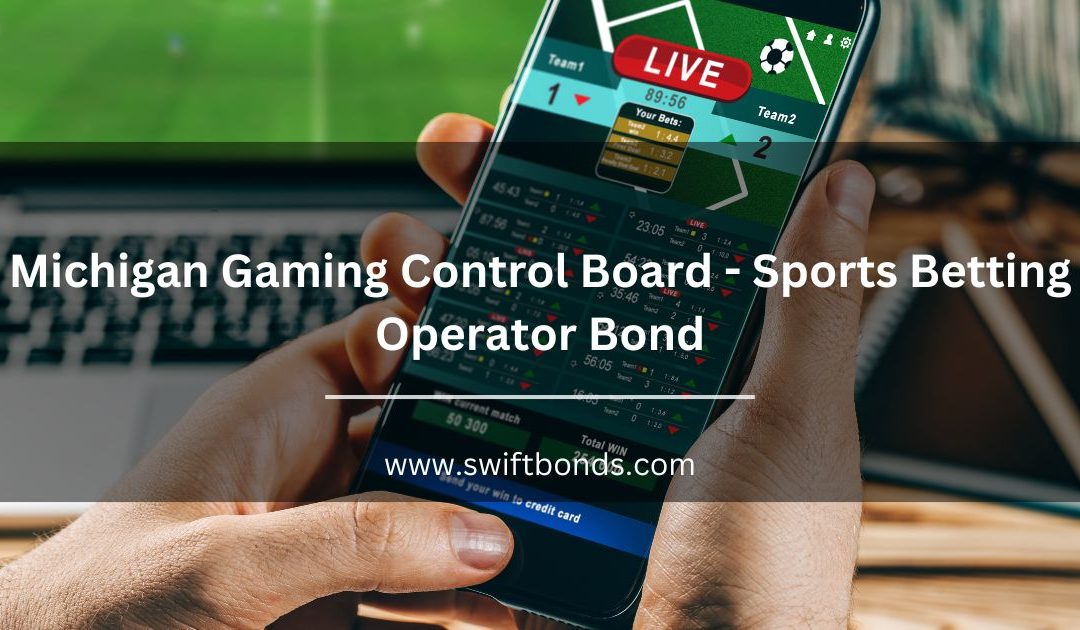Get an Instant Quote on Sports Betting Operator Bond
Introduction
From our perspective, operators entering Michigan’s sports betting market are stepping into a highly regulated space that demands transparency and financial accountability. The Michigan Gaming Control Board - Sports Betting Operator Bond is a fundamental requirement for any business seeking to offer sports betting under a state-issued license.
This bond protects the public and the state by guaranteeing that licensed operators comply with all applicable rules, pay fees and taxes on time, and uphold the terms of their license. If an operator fails to meet these obligations, the bond acts as a financial backstop that covers losses the state might incur. That means the state can file a claim and recover funds without relying solely on litigation.
For licensed operators, this bond reinforces credibility. It assures the Michigan Gaming Control Board and customers that the business is serious about compliance. Whether launching a retail sportsbook or managing an online betting platform, this bond is part of the foundation that keeps the operation running smoothly and legally.
As with all regulatory bonds, understanding the purpose and process can keep your licensing on track and your business reputation strong.
Why Bonding Can Be Confusing
We’ve noticed that new operators often misunderstand the difference between general business insurance and a surety bond. The Michigan Gaming Control Board - Sports Betting Operator Bond is not a protective policy for the business itself—it’s a financial guarantee made to the state. If the operator doesn’t meet their regulatory or financial obligations, the state can use the bond to recover the loss.
There’s also confusion about how this bond fits into the licensing process. Many assume it’s optional or something to handle later, but the bond must be submitted as part of the licensing application. Delays in securing the bond often lead to licensing issues, launch postponements, or compliance violations.
Some applicants also aren’t aware that this requirement is separate from bonds used in other industries. For example, contractors may be more familiar with the City of Sylvan Lake, MI - Right of Way Permit Bond or the Michigan Regional Council of Carpenters - Wage & Welfare Bond, which serve entirely different regulatory purposes. Understanding the unique function of each bond is key to staying compliant.

How Swiftbonds Helps
Based on our experience, working with the right bonding partner makes the process faster, clearer, and less stressful. Swiftbonds specializes in helping operators meet Michigan’s strict bonding requirements with accuracy and speed.
We guide applicants through every step, from understanding how the bond supports regulatory compliance to helping you avoid the kind of delays that frustrate both operators and regulators. Our team handles the technical requirements so you can focus on what matters—launching and managing your sports betting operation.
Swiftbonds also understands the different types of bonds businesses may need across Michigan. If you’re involved in other areas—say, public works or construction—you may need additional bonds like the Michigan Regional Council of Carpenters - Wage & Welfare Bond or the City of Sylvan Lake, MI - Right of Way Permit Bond. Whatever your need, we help ensure your paperwork is complete and your obligations are met.

Steps to Get This Bond
What we’ve discovered is that getting the Michigan Gaming Control Board - Sports Betting Operator Bond can be broken down into a few simple steps:
-
Review Licensing Requirements: Visit the official Michigan Gaming Control Board (MGCB) website and confirm the bond amount required for your license class.
-
Apply with Swiftbonds: Submit your application through our secure online portal, providing basic business and financial information.
-
Underwriting Review: Swiftbonds reviews your information and evaluates risk. Most bonds can be approved quickly if documents are in order.
-
Receive the Bond: Once approved, you’ll receive the bond document for submission with your MGCB licensing package.
-
Stay Compliant: Keep your bond active and avoid claims by following all MGCB rules, paying fees on time, and reporting any changes as required.
This process helps sports betting operators meet regulatory expectations without delay or uncertainty.

Why You Should Act Early
We’ve found that applying for your bond early in the licensing process helps you avoid unnecessary setbacks. Waiting until the last minute often results in delays, especially if additional underwriting or credit checks are needed.
Timing matters. The MGCB won’t issue a license without proof of bonding, which means your launch date could be pushed back—impacting marketing campaigns, partnerships, and revenue goals.
This applies across industries. We’ve seen contractors delay projects waiting on a City of Sylvan Lake, MI - Right of Way Permit Bond, or trade contractors facing union-related compliance issues tied to the Michigan Regional Council of Carpenters - Wage & Welfare Bond. In every case, planning ahead makes a measurable difference.
Bonding isn’t just about paperwork—it’s about clearing a path forward for your business to grow.

What Happens Without This Bond
In our observation, missing or mishandling bond requirements puts your entire operation at risk. Without the Michigan Gaming Control Board - Sports Betting Operator Bond, your application will likely be rejected or placed on hold. If you’ve already launched operations and your bond lapses, you could face fines, license suspension, or public trust issues.
Operators who misunderstand their bond obligations may end up with an incorrect bond type, an expired bond, or one that doesn't meet the required coverage level. Each of these issues can cause legal or financial consequences with the MGCB.
We’ve worked with clients who faced significant setbacks from bond-related issues in other sectors—from excavators needing a City of Sylvan Lake, MI - Right of Way Permit Bond to contractors navigating collective bargaining compliance with the Michigan Regional Council of Carpenters - Wage & Welfare Bond. The takeaway is simple: the right bond, handled the right way, protects your ability to operate.
What Success Looks Like
We’ve learned that successful operators are those who treat bonding like a serious business requirement—not a side task. When you handle your bond correctly, the MGCB sees your operation as credible, compliant, and trustworthy. That matters when applying for renewals, expanding your operations, or seeking approval for additional licenses.
Working with Swiftbonds gives you more than just a bond—it gives you a reliable partner who understands Michigan’s regulatory expectations. Whether you’re applying for a Michigan Gaming Control Board - Sports Betting Operator Bond, handling public works with a City of Sylvan Lake, MI - Right of Way Permit Bond, or managing labor obligations tied to a Michigan Regional Council of Carpenters - Wage & Welfare Bond, you’ll receive accurate support and timely service.
Compliance opens doors. When you’re properly bonded, you can focus on what you do best: growing your business.
Michigan Bonding Rules
The Michigan Gaming Control and Revenue Act (Public Act 95 of 1997, as amended) empowers the Michigan Gaming Control Board to oversee all sports betting activity in the state. Under MGCB rules, all licensed sports betting operators must furnish a bond to protect the state from losses related to unpaid fees, taxes, or regulatory violations.
This is separate from Michigan construction-related bonds, which fall under the Michigan Little Miller Act (Mich. Comp. Laws § 129.201 et seq.). That statute applies to public works contractors and requires performance and payment bonds for projects over $50,000.
If your company operates across sectors, you may need several bond types. For example, a contractor expanding into gaming hospitality may need both a Michigan Gaming Control Board - Sports Betting Operator Bond and a Michigan Regional Council of Carpenters - Wage & Welfare Bond. Bond requirements vary by industry and must be verified with each regulatory body.
For current laws and licensing guidelines, visit the Michigan Gaming Control Board website or the Michigan Legislature’s site.
Conclusion
We’ve come to appreciate that the Michigan Gaming Control Board - Sports Betting Operator Bond plays a vital role in establishing trust, meeting legal requirements, and creating long-term business stability. It’s more than a formality—it’s a signal to regulators and the public that your operation takes compliance seriously.
Swiftbonds stands ready to help you get the right bond quickly and with complete confidence. Whether you need a sports betting bond, a City of Sylvan Lake, MI - Right of Way Permit Bond, or a Michigan Regional Council of Carpenters - Wage & Welfare Bond, you’ll get expert guidance and efficient service every step of the way.
Apply today and take the first step toward secure, worry-free operations in Michigan’s regulated markets.
Frequently Asked Questions
What does the Michigan Gaming Control Board - Sports Betting Operator Bond cover?
We’ve often noticed people ask this. The bond guarantees that a licensed operator will comply with all MGCB rules, including timely payment of taxes and fees. If they don’t, the state may claim against the bond to recover losses.
Who is required to obtain this bond?
Any entity applying for a sports betting operator license in Michigan must provide this bond as part of their licensing process. This includes both retail and online operators.
How much does this bond cost?
We’ve often noticed questions about pricing. The bond cost is based on the bond amount required by the MGCB and your creditworthiness. Rates typically range from 1% to 5% of the bond amount.
How long does it take to get this bond?
Most bonds can be issued within 24–48 hours once the application and underwriting process are complete. Swiftbonds helps speed up the process by handling all details efficiently.
Can this bond be canceled or expire?
Yes. If the bond is canceled or lapses, the MGCB may suspend or revoke your license. It’s important to maintain continuous bond coverage to avoid compliance issues.


